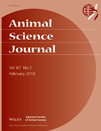 The authors of a paper on a new probiotic strain of bacteria found in pig feces have retracted it from Animal Science Journal after discovering some of the bacteria might have been contaminated.
The authors of a paper on a new probiotic strain of bacteria found in pig feces have retracted it from Animal Science Journal after discovering some of the bacteria might have been contaminated.
Readers likely know by now how easy it is for this to happen, as we frequently report on retractions due to similar reasons. Like other instances of mistaken cell identity, the authors of this 2013 paper realized the mistake following further tests of the bacteria used in the experiment.
The retraction for “Isolation, characterization, and effect of administration in vivo, a novel probiotic strain from pig feces”
has been retracted by agreement between the authors, the journal Editor in Chief, Masahiro Satoh, and Wiley Publishing Asia Pty Ltd. The retraction has been agreed as data shown in Figure 1 of the article in relation to the in vitro portion of the study may be inaccurate. This is because further tests performed indicated that lactic acid bacteria used in the experiment may have been affected by sample contamination with different bacteria.
The paper has been cited four times, according to Thomson Reuters Web of Science.
We’ve reached out to first author Yasuhiro Ihara, who works with the Research and Development Center for Nippon Meat Packers, Inc. in Japan. We’ll update this post with anything else we learn.
Bonus: McSweeney’s has the scoop on issues with another publication related to feces — check out, “I falsified the data in my bestselling book Everyone Poops.”
Like Retraction Watch? Consider making a tax-deductible contribution to support our growth. You can also follow us on Twitter, like us on Facebook, add us to your RSS reader, sign up on our homepage for an email every time there’s a new post, or subscribe to our new daily digest. Click here to review our Comments Policy. For a sneak peek at what we’re working on, click here.